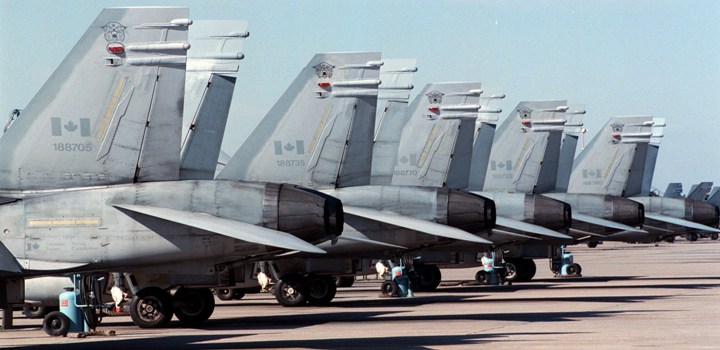OTTAWA – Junior members of the military at the air base in Cold Lake, Alta., have to take second jobs to make ends meet, says a new report from the military ombudsman.

Pierre Daigle investigated the sky-high cost of living in the resource-rich region of Alberta after complaints from people posted to 4 Wing, a major jet-fighter base.
“I was surprised,” Daigle said in an interview Tuesday.
Some families are struggling to pay bills by selling off possessions, and go to great lengths to keep their children in extracurricular activities.
The mostly non-commissioned members aren’t trying to get ahead – they need the extra income to survive, said Daigle.
“They are just trying to keep what they have, and what they have built up over their lifetimes,” he said.
The cost of living at Cold Lake has soared in recent years, driven by growth in the local oil-and-gas industry, the report found.
As many as a third of the members of one squadron have had to take second jobs. The investigation also found that some air force members choose to retire rather than accept a posting at the base.

Get daily National news
The finding should alarm military brass because it affects operational effectiveness and getting the right people in the jobs, Daigle said.
National Defence needs to grapple with losing highly skilled technicians and senior non-commissioned officers lured to work on oil rigs, says the report.
- Canadian immigration officers investigating hundreds identified by extortion task force
- Ottawa expects Ukrainian emergency visa holders to return after war ends
- As new EV rebate program starts, car dealers still seek past reimbursements
- China drops visa requirement for Canadian tourists, business visitors
“You don’t replace those senior folks overnight,” Daigle said.
The problem is no surprise to the town’s mayor, Craig Copeland, who says many businesses in the city depend on the part-time labour pool created by military members.
Copeland suggested the numbers in the ombudsman report may even understate the problem.
“To be honest with you, I thought they were low. Boy, if it wasn’t for the military members, a number of our business people would be really hurting for staff,” he said in an interview.
Daigle says there’s little off-base accommodation available, and rent for military housing at Cold Lake is double that charged at major air bases in Greenwood, N.S., and Bagotville, Que.
He recommends National Defence re-examine a posting allowance that reflects economic conditions around the base.
The Post Living Differential has been a lightning rod for troops since 2009 when changes were suggested that would have used Ottawa as the benchmark for the subsidy.
Soldiers and other military personnel receive a stipend whenever they’re posted in a high-cost area of the country, but the allowance is divided between rural and urban areas.
The net effect is that air force crews and technicians posted in Cold Lake receive 50 per cent less allowance than those in Edmonton, despite the wide cost difference.
Defence Minister Peter MacKay said the government recognizes the problem and is taking steps to ease the pain. Recently a number of military housing construction projects and renovations were announced for the base.
A rent freeze was also imposed.
“We have already responded to some of the complex malaise of issues affecting Cold Lake,” MacKay said in Ottawa on Tuesday. “We are facing a real shortage of affordable housing there.”
Daigle said much of what National Defence is doing will help in the long term, but families need “immediate relief” and one route should be through an adjustment to the posting allowance.







Comments
Want to discuss? Please read our Commenting Policy first.